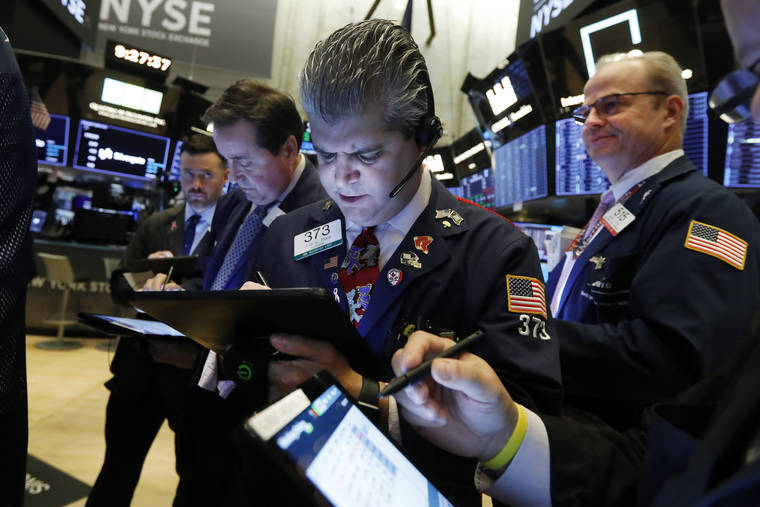NEW YORK — Stocks pushed toward another round of records Thursday following encouraging signs that the U.S.-China trade war is becoming less of a threat to the economy and to company profits.
China’s commerce ministry said that both sides in the trade dispute agreed to roll back some tariffs on each other’s goods, as they hash out the details of a “Phase 1” deal initially announced last month. If they do, it could mean stronger profit growth ahead for companies and also remove — or at least reduce — one of the darkest clouds hanging over the global economy.
In midafternoon trading, the S&P 500 was on pace to clinch an all-time high for a second time this week, while the Dow Jones Industrial Average and Nasdaq composite were tracking for their third.
Leading the way for the market were companies in industries that do best when the economy is strengthening, such as oil producers and banks. In another sign of optimism about the economy’s prospects, Treasury yields jumped higher. Gold fell as investors felt less need to hide out in assets seen as safe.
KEEPING SCORE: The S&P 500 was up 0.3%, as of 3:15 p.m. Eastern time. The Dow Jones Industrial Average climbed 180 points, or 0.7%, to 27,672, and the Nasdaq composite rose 0.3%.
LIFTING CLOUDS: President Donald Trump’s trade war has been one of the biggest concerns for investors since early 2018. Increased tariffs not only raise costs and sap profits for U.S. companies. They also can and have made CEOs hesitant to spend on new factories, expansions and other investments given all the uncertainties about what the rules of trade will be.
If progress continues on the trade front, it would add to a growing pile of encouraging data on the economy. Besides last week’s solid jobs report, the Federal Reserve has also cut interest rates three times since the summer, which helps support stock prices and economic growth. Corporate profits from the summer have also proven to be not as bad as analysts feared.
Altogether, it means the worries about a possible recession that dominated markets just a few months ago are diminishing. That in turn has more on Wall Street confident that this bull market for stocks, which already is the longest on record, can keep going.
“Bull markets end in recessions,” said Steve Chiavarone, equity strategist at Federated Investors. “It’s been that way since the beginning of time and will be that way until the end of time. The storm clouds have dissipated, and we’ve cancelled the 2020 recession in the market’s mind.”
Of course, a breakdown in the U.S.-China talks could upset things, as they have in the past. But investors aren’t looking for the two sides to reach a deep, structural deal that settles all their disputes, Chiavarone said. They just want conditions to stop getting worse.
“What we’re talking about is not a solving of this conflict but a de-escalation of the trade tensions,” he said. “We have sufficient evidence that the economy is OK. We know earnings are OK. The thing that’s left is whether trade comes to fruition.”
JUST BEAT IT: More than a dozen companies joined the lengthy parade of those reporting stronger profits for the latest quarter than analysts expected.
Qualcomm jumped 5.6% after it reported both revenue and earnings that topped Wall Street’s forecasts.
Ralph Lauren surged 13.8% for the biggest gain in the S&P 500 following its own better-than-expected results.
Companies are no longer getting the benefit of the first year of lower tax rates, and they’re also contending with a slowing global economy weighing on their sales. But the S&P 500 is on track to report a drop of 2.5% in third-quarter earnings per share from a year earlier, versus the 4% that analysts initially expected, according to FactSet.
RATE WATCH: The yield on the 10-year Treasury climbed to 1.92% from 1.81% late Wednesday. It has risen sharply over the last five weeks and is close to its highest level since the start of August.
CYCLICAL SPURT: Bank stocks, whose profits benefit from higher rates for mortgages and other loans, climbed to some of the market’s biggest gains.
So did oil companies and others that Wall Street calls “cyclical” stocks because their profits are so closely tied to where the economy is in its growth-and-recession cycle.
Energy stocks jumped 1.3% for the largest gain among the 11 sectors that make up the S&P 500. It’s a turnaround from a few months ago, when utilities and other so-called “defensive” areas led the way.
On Wednesday, these kinds of stocks that tend to hold up better when the economy is souring got left behind. Utilities sank 1.5% for the largest loss in the S&P 500.
HIGH TIDE: SeaWorld Entertainment surged 10.4% after the theme park operator named an executive from the timeshare and resort industries as its new CEO. Sergio Rivera will lead the company months after the previous CEO abruptly resigned.
TRIP HAZARD: Several companies that focus on travel were punished by investors after reporting weak results. TripAdvisor plunged 21.4%, and Expedia Group plummeted 26.7%.


